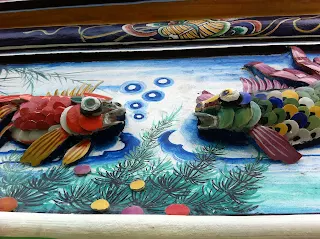
With Georgetown, Penang and Malacca in Peninsular Malaysia added to the list of UNESCO heritage sites, there has been some activity in urban renewal from the freed up funding to support investment in rebuilding, renovating and renewal. I recently had lunch at one such redevelopment along Chulia Street in Georgetown - the Yeng Keng Hotel was once a family mansion, then a backpackers' hostel and now a refurbished heritage experience hotel. Much effort had gone into revitalising the motifs, foliage and ambiance in this location. The experience, as you walk through its cool passages, corridors and rooms, can be eclectic and multi-cultural but mostly Straits Chinese.

Yeng Keng is one of several sights worth stopping by as you take the Georgetown heritage walk, covering four main ethnic groups within a maximum two hour stroll. The retro hotel sits in the centre of a precinct that has Little India, Chinatown, Arab Quarter and Colonial Penang all within inspection within a kilometre. Thrown in are food stalls reflecting the variety available in south and south-east Asia, a relaxed pace and many sights and sounds to take in. Above, an indoor plant sits within a much loved and used container that reminds me of pickled rambutan fruit and water jars. Below a wall motif representing the local and tropical hibiscus utilises Arab and Indonesian influences in art.


The penchant for iconic Chinese themes - like the phoenix (below), mountain and ocean scenery and blossoming leafy flora (pictures above) - permeates Yeng Keng. The hotel has retained its imposing gateway but added a small wade pool at the back.

Above image captures the coffee corner at the front of Yeng Keng Hotel. It also has a dedicated bar and dining room apart from the main hotel building. Georgetown was founded by Captain Francis Light in the late 18th century - Light came to this part of the world based on the support of the British East India Company, after the Brits had lost the American colonies to independence. Light saw the potential of Penang Island as a middleman, broker and political controller of the rewarding trade route at the northern end of the Straits of Malacca. He negotiated the purchase and use of Penang Island from the then Sultan of nearby Kedah State on the mainland. The rest, as they say, is history - and Light's own son, William, went on to found Adelaide in South Australia.

Some of the original features of the Yeng Keng hotel building have been retained. Above, a window configuration up close and below, a cupboard displaying some of the interesting excavated items from the recent renovation of the site. Guest rooms in the new Yeng Keng have high ceilings - and the suites have furniture imported from the Czech Republic as well.













1 comment:
This is a real find. I chose it because of recommendations on Tripadvisor and it's #1 ranking is well deserved. Brilliantly located, very friendly and helpful service and spotlessly clean. Yes the rooms (Mansion double in my case) are small but large spaces would destroy the character and they are well cooled with safes and free wi-fi. All the staff..
Post a Comment